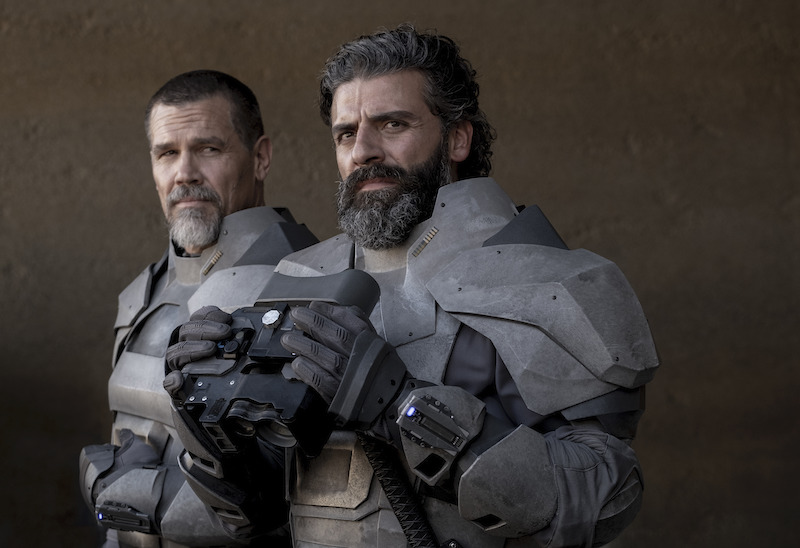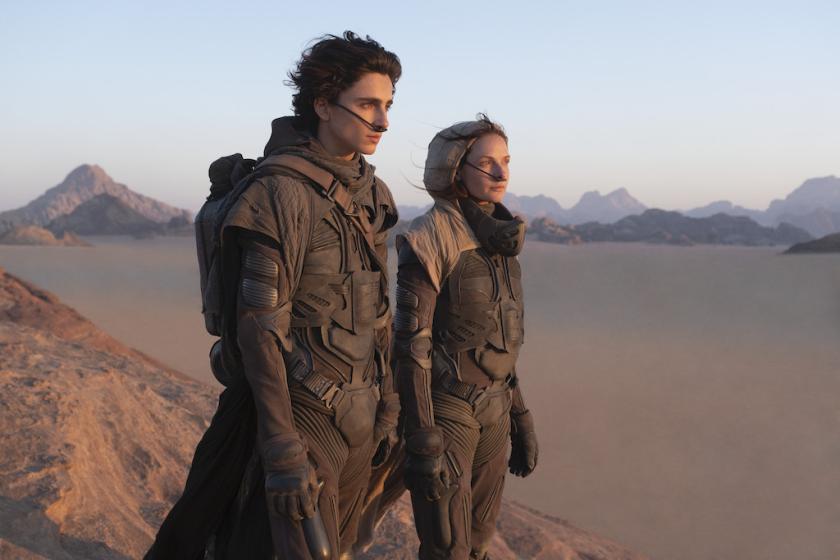I’d venture that Denis Villeneuve’s adaptation of Frank Herbert’s 1965 sci-fi classic is an almost perfect adaptation. It’s difficult to imagine the novel being better visualised, or its characters better cast; at the same time, the director’s own sensibility is very much in evidence – we can feel Blade Runner 2049 and Arrival in Dune’s DNA. The result is a great coming together of source and adaptor, an awesome, breathtaking epic.
And Dune is a daunting monster to adapt (that’s just the first volume), as proven by the visionary David Lynch’s honourable, but excruciating version from 1984. Lynch attempted to condense Herbert’s complex weave of sci-fi technologies, political intrigue, ecology, religion, superstition and myth into a single two-hour film. The result was fairly incomprehensible, deadly dull yet bizarrely kitsch; one can’t easily forget the sight of Patrick Stewart storming into battle holding a pug in his arms.
In contrast, Villeneuve’s decisions to cut the book in half (Part II is yet to be confirmed, but highly likely) and play it with a very straight bat are largely successful. In his hands, the tale of a young man’s survival and self-discovery, as rival factions tear themselves apart on a treacherous desert planet, is earnest but consistently compelling.  The initial set-up makes one think that Dune must have inspired George R.R. Martin’s Game of Thrones. The noble Duke Leto Atreides (Oscar Isaac, above right, with Josh Brolin) is ordered by the Emperor to leave his home planet, Caladan, and assume stewardship of the desert planet Arrakis, or Dune, which is source of the most valuable spice in the universe. Among its many attributes, ‘melange’ increases life expectancy and facilitates space travel; imbibe too much, and it turns your eyes blue.
The initial set-up makes one think that Dune must have inspired George R.R. Martin’s Game of Thrones. The noble Duke Leto Atreides (Oscar Isaac, above right, with Josh Brolin) is ordered by the Emperor to leave his home planet, Caladan, and assume stewardship of the desert planet Arrakis, or Dune, which is source of the most valuable spice in the universe. Among its many attributes, ‘melange’ increases life expectancy and facilitates space travel; imbibe too much, and it turns your eyes blue.
In taking over Arrakis, the Atreides will replace their bitter rivals, House Harkonnen. And the repulsive, thoroughly evil Baron Harkonnen (Stellan Skarsgård) is in no mood to give up his cash cow lightly. So the reluctant Leto knows this is a poisoned chalice, if not an outright trap. The mood as the Atreides household, including Leto’s concubine Jessica (Rebecca Ferguson) and their son Paul (Timothée Chalamet), prepares to leave their fertile planet for the arid Dune is one of regret and foreboding.
Leto is not the key Atreides in this story, but Paul. On Caladan the boy is beset by dreams with the ring of prophecy about them. His mother has been teaching him powers of telepathy and mind control that are usually confined to the women in her religious sect. And when Jessica’s former teacher (the reliably terrifying Charlotte Rampling) submits him to a test involving a box, a poisoned needle and indescribable pain, he confirms that he might just be a tad special.
Chalamet already has a sort of blessed aura about him, so he’s a perfect Paul – spirited, aloof and otherworldly; he’s also played Henry V, so can more than hold his own in a fight. Alongside him as this instalment’s principal figure, Ferguson (the all-action heart of the recent Mission Impossible films) appealingly conveys both Jessica’s power and maternal concern.  Josh Brolin and Jason Momoa are suitably charismatic as Paul’s battle-hardened, swashbuckling mentors, while Jarvier Bardem (pictured above) and Zendaya take the reins when the action moves into the desert as Fremen, the mysterious Dune natives who are crucial to Paul’s future. But it’s unwise to get too attached to anyone, for the film’s fidelity to its source extends to Herbert’s casual way of despatching principals (one benefit of not knowing the book).
Josh Brolin and Jason Momoa are suitably charismatic as Paul’s battle-hardened, swashbuckling mentors, while Jarvier Bardem (pictured above) and Zendaya take the reins when the action moves into the desert as Fremen, the mysterious Dune natives who are crucial to Paul’s future. But it’s unwise to get too attached to anyone, for the film’s fidelity to its source extends to Herbert’s casual way of despatching principals (one benefit of not knowing the book).
While it takes 45 minutes for the film to reach Arrakis, once it does the combined wonderment of design, cinematography and special effects goes into overdrive. There are space ships whose curvilinear beauty evokes the visiting ships from Arrival; Herbert’s cutely conceived helicopters whirr into life like insects; while their combat gear makes the Atreides soldiers look like mini-tanks, the figure-hugging desert suits belong on a catwalk; the gigantic sand worms that protect the spice are behemoths that may make you think twice about a day on the beach. Throughout, Hans Zimmer’s powerful, percussive soundtrack adds enormously to the motor and expression of the film.
Villeneuve’s script, co-written with Jon Spaihts and skilled old hand Eric Roth (Forrest Gump, A Star is Born, Mank) adopts the book’s slow-burn release of information – to the extent that the emperor’s role and motivation are still to be revealed – as well as a certain humourlessness. As a result, the film could perhaps use a little more clarity and levity.
Yet it ends in exactly the right place, offering much food for thought over what comes next – love, war, revenge, mysticism and a lot more worm. For now, this is a formidable, breath-taking exercise in world-building.















Add comment